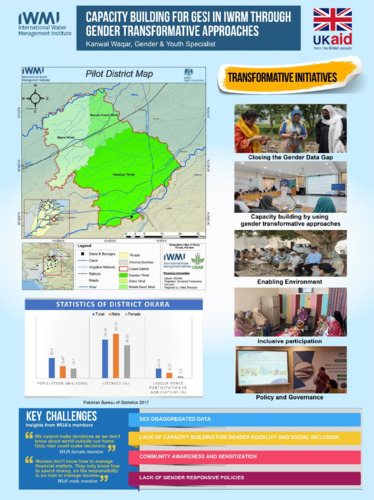Capacity Building for gender equality and social inclusion in Integrated Water Resources Management through Gender Transformative Approaches
Abstract
The participation and empowerment of women and youth in water management in rural agricultural communities is very limited in Pakistan. The links between water, climate, gender disparities and social exclusion are prominent at national and provincial levels. Under this scenario, one of the International Water Management Institute initiatives i.e., the Water Resource Accountability in Pakistan Program Component 1: Climate-Resilient Solutions for Improving Water Governance (CRS-IWaG) funded by the Foreign, Commonwealth & Development Office is working to strengthen the capacity of federal, provincial and district level water managers. In this regard, the IWMI gender team was the first to conduct an in-depth gender analysis at the district and province level by adopting gender-transformative approaches. The analysis focused on: (a) identifying the capacity of national, provincial and local departments for gender mainstreaming, (b) women’s participation, access and control over agricultural production and water resource management, (c) sociocultural division of gender labor, and (d) devising possible strategies for genderinclusive planning. The results of the study show: (a) the need of capacity building and sensitization about GESI at all levels, that is in government institutions, water user associations and farmer groups, (b) lack of sex-disaggregated data to devise inclusive strategies. Recommended initiatives include: (a) capacity-building training on GESI in IWRM at district, province, and federal levels, (b) awareness sessions with male groups of WUAs, and (c) producing easily adoptable practitioner ‘cheat sheets’. The implications of these initiatives would be capacity building of government officials from water and agriculture departments for gender-inclusive project planning and implementation.

